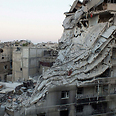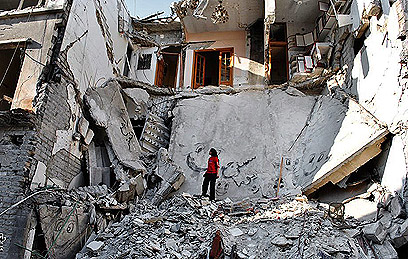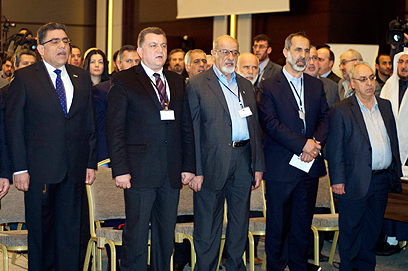
The warehouse itself was located in a military base some 20 km outside the city and an army source spoke to Al Manar's television station and said that the missile originated from the battles currently being conducted in the town, however, contradictory reports have emerged.
Related stories:
- Fierce fighting batters Syria's strategic city of Homs
- Syria opposition meets to find leader, show they're ready for arms
- Syria's Assad declares fall of 'political Islam'
The website for the Free Syrian Army, the main rebel group, has reported has stipulated a number of alternative theories regarding who and what caused the Latakia explosion. Among the explanations proposed was the presence of "enemy aircraft" as well as rebel operated missiles. However, both claims were purely speculative.
The website of Al Manar, a Lebanese network owned by Hezbollah, published a story under the headline: "Military source to Al Manar: This is what really happened in Latakia."
The story claims that a number of consecutive blasts were heard in the area but that an army investigation revealed they were stray mortars that fell within the army base, and whose origin was local clashes. The source denied claims that the attack originated from the air or sea, and certainly not at the hands of "enemy aircrafts."
Battle of Homs
An activist and Syrian state media said regime troops were advancing in parts of the rebel-held city of Homs Saturday.

Homs (Photo: AP)
Homs-based activist Tarik Badrakhan said Saturday that Syrian troops seized control of buildings in the rebel-held district of Khaldiyeh, the first time government forces entered Homs neighborhoods held by rebels for over a year. Syrian state media said troops were advancing and they had killed rebels in the area.
Badrakhan says troops began the move Friday night.
According to him, regime forces continued to pound the area with mortar shells and missiles Saturday, part a major offensive by President Bashar Assad's troops to seize control of territory they lost to rebels.
Homs is a strategic city located between the capital Damascus and the Syrian coast, a stronghold for the Assad regime.
Political standstill
Amid the ongoing battle, the deeply divided UN Security Council failed to approve a statement calling on the Syrian government to allow immediate access to 2,500 civilians trapped in the besieged city of Homs.
Russia, Syria's closest ally, and Western nations, which support the opposition, were again at odds – as they have been since the Syrian conflict began over two years ago.
Austria and Luxembourg circulated a draft press statement earlier this week expressing "grave concern" at the plight of the trapped civilians and calling for Syria to allow "immediate, safe and unhindered access" to Homs for UN and other humanitarian workers so they could assist civilians in need, especially those requiring medical treatment.
Russia's UN Mission said it proposed an alternative statement which called for immediate access to Homs as well as the predominantly Shiite government-controlled towns of Nubul and Zahra, which the opposition fighters are seeking to take.
UN diplomats said supporters of the original statement insisted on focusing on Homs, a strategic central city of about 1 million located on the road between the capital Damascus and regime strongholds on the Mediterranean coast, and refused to equate the scale of the attack there with fighting in the two small villages.
Russia rejected compromise language proposed by the original statement's supporters which called for immediate access "to reach civilians in Homs and all areas of ongoing hostilities," the diplomats said, speaking on condition of anonymity because negotiations were private.

Syrian opposition (Archive: MCT)
Syria's opposition also hit deadlock on Friday in talks in Istanbul to elect a new leader, as the toppling of Egypt's Muslim Brotherhood dealt a blow to its most influential faction.
The stalemate is preventing the main players in the Syrian National Coalition from reaching a deal acceptable to their Saudi and Qatari backers, who want to strengthen the opposition to counter an onslaught by Assad's forces.
Sources in the Arab- and Western-backed coalition said the fate of an agreement hinges on the Syrian Muslim Brotherhood, the only organized group in the opposition, which holds a balance of votes between a Saudi-backed and a Qatari-backed candidate.
But the group is reeling from this week's political blow its mother branch in Egypt, where the armed forces intervened to topple Islamist President Mohamed Morsi after massive street protests.
"The atmosphere is subdued. The Brotherhood in Egypt, and by extension in Syria and elsewhere, took a blow, but even their opponents feel that the Middle East lost a historic opportunity to convince Islamists to embrace democracy," a coalition official said in Istanbul, where the opposition is meeting.
The Syrian opposition voted on Saturday to elect a new leader, but the top two candidates failed to gain a simple majority needed to become president of the coalition fighting to oust President Bashar Assad.
A runoff ballot was scheduled for later on Saturday after Ahmad Jarba, a tribal figure linked with Saudi Arabia, and Mustafa Sabbagh, a businessman who is Qatar's point man, did not gain more than half of the votes in the 115 member Syrian National Coalition in an early morning ballot in Istanbul.
The coalition is split into three power centers: the Muslim Brotherhood, the Sabbagh faction, and a Saudi-backed bloc that includes Jarba.
The three factions held the vote for a new leader after failing to agree on a compromise candidate.
The coalition has been without a leader for months after its head quit over disagreement over potential talks with Assad's government.
Reuters and the Assoicated Press also contributed to this report
- Receive Ynetnews updates
directly to your desktop















